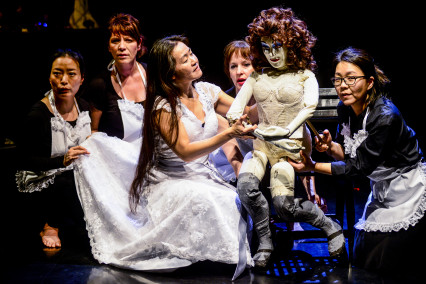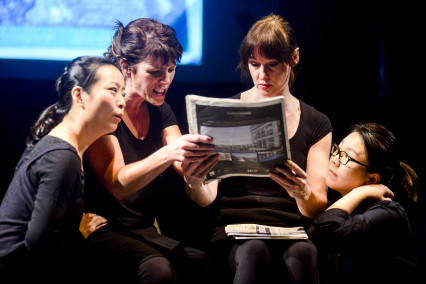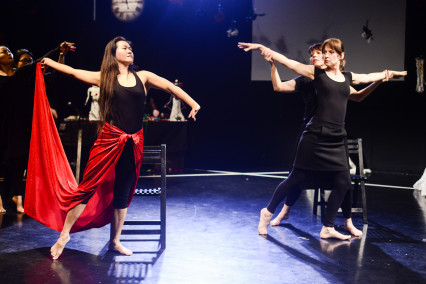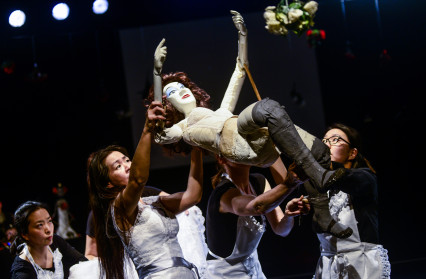When theatre occasionally wriggles free from the straight-jacket of linear narrative there is, perhaps, no more effective art-form for interrogating the contingencies and potentialities that surround a single moment of space-time. In such a moment, charged with the twin forces of past and future, it is possible to feel the weight of history upon the present while, simultaneously, being able to intuit the profound consequences of events that are still in flux. The considerable achievement of playing ‘the maids’ – a dazzling intercultural collaboration from the Llanarth Group (Wales), Gaitkrash (Ireland) and Theatre P’yut (Korea) – is that our contemporary moment of global economic crisis is explored, with great clarity, purpose and theatrical power, from the multi-perspectival viewpoint of nine creative collaborators from four countries, working in four different languages and from a variety of theatrical and musical traditions. The intellectual rigour of the piece is impressive, in particular its meta-theatrical treatment of Jean Genet’s modernist masterpiece The Maids, but crucially at the heart of the piece is the stark reality that the product of economic and gender inequality is only human suffering, rage and despair.
The choice of The Maids as source material for a piece about inequality seemed particularly apposite for the creative team, as cellist Adrian Curtin – who provided the musical accompaniment and vocalised stage directions in performance – explains: ‘In Genet’s play, servitude is toxic and corrosive; it ensnares all involved and is perpetually dynamic.’ The mutual entanglement of mistress and servant in a dynamic of power infuses Genet’s work with a disturbing atmosphere of menace, eroticism and exploitation, which remain relevant to modern audiences. Curtin adds, ‘Where is power located? What guises does it take? What are its effects? Genet’s text provided an excellent framework with which to explore these questions’. However, the globalisation of the world economy in the past thirty years, and in particular the ‘rise’ of the Asian economies; coupled with decades of feminist and post-feminist thought, have complicated the question of economic and gender inequality beyond the rigidly class-based politics of Genet’s play. Director Phillip Zarrilli says: ‘[W]hen we initiated our collaborative process, we agreed to use Genet’s play as a ‘foil’ – a beginning point for responding in new ways to the powerful issues that underlie the play’. The result is a performance piece – it resists simple definition as a play – that responds to the complexities and nuances of modern globalised capitalism and the legacies of imperialism.
 This collective decision to use The Maids as an inspirational source, rather than as a primary text that the production might serve, was not only important in terms of liberating the nine creative collaborators to explore beyond Genet’s analysis of power, it also meant that a fully intercultural collaboration between them was made possible. The aspirations of multiculturalism are laudable and desirable with regard to militating racial discrimination and encouraging religious tolerance, but in practice it too often works to eradicate genuine cultural differences in pursuit of its aims of social integration or assimilation. Interculturalism is concerned with dialogue and exchange, it recognises and insists on difference but does not recognise the dominance of one culture over another. In Cultivating Humanity Martha Nussbaum observes that interculturalism recognises ‘common human needs across cultures and of dissonance and critical dialogue within cultures’. With the intention of creating a performance piece that would question, criticise and satirise the power interests of global capital, neo-imperialism and the super-rich oligarchs of East-Asian economies, the imperative of finding some ground on which an intercultural dramaturgical dialogue could take place was clear to all involved in playing ‘the maids’. Genet’s play was therefore situated as a meeting point at which each creative collaborator could engage as theatre artists, all incorporating their own cultural-specific responses to the source play within the process of play-making.
This collective decision to use The Maids as an inspirational source, rather than as a primary text that the production might serve, was not only important in terms of liberating the nine creative collaborators to explore beyond Genet’s analysis of power, it also meant that a fully intercultural collaboration between them was made possible. The aspirations of multiculturalism are laudable and desirable with regard to militating racial discrimination and encouraging religious tolerance, but in practice it too often works to eradicate genuine cultural differences in pursuit of its aims of social integration or assimilation. Interculturalism is concerned with dialogue and exchange, it recognises and insists on difference but does not recognise the dominance of one culture over another. In Cultivating Humanity Martha Nussbaum observes that interculturalism recognises ‘common human needs across cultures and of dissonance and critical dialogue within cultures’. With the intention of creating a performance piece that would question, criticise and satirise the power interests of global capital, neo-imperialism and the super-rich oligarchs of East-Asian economies, the imperative of finding some ground on which an intercultural dramaturgical dialogue could take place was clear to all involved in playing ‘the maids’. Genet’s play was therefore situated as a meeting point at which each creative collaborator could engage as theatre artists, all incorporating their own cultural-specific responses to the source play within the process of play-making.
Writing in Exeunt, Irish-born Wales-based playwright, Kaite O’Reilly, describes how intercultural dramaturgy makes particular demands of its collaborative creative partners, in that the customary defined roles of ‘director’, ‘writer’ and ‘performer’ become somewhat opaque, as each member of the company is required to introduce material of some kind toward the development of the piece.
‘In other productions, roles have been clear and the lines agreed and drawn … In this fascinating collaboration roles have deliberately been as porous and overlapping as the creative process. All nine company members have taken equal part in proposing material, leading exploratory material-generating workshops responding to the source from our particular cultural and artistic perspectives.’
Allowing typically prescribed creative roles to become ‘porous and overlapping’ can liberate and empower individual performers to coalesce as a richly-textured ensemble, equally, it can also threaten unnecessary confusion and chaos in the rehearsal room. It is therefore essential that working relationships of deep mutual trust be established when creating work in the open and inclusive manner described above. Happily, playing ‘the maids’ benefitted from what O’Reilly describes as ‘the firm foundation created by previous collaborations between the various artists involved.’ Crucially, Zarrilli has worked for a number of years with all five actors involved in the project, who have each received training in the director’s psychophysical training.
The psychophysical process has been developed by Zarrilli from the mid-seventies, with the purpose of preparing and awakening the ‘bodymind’ of the actor. It incorporates physical, mental and spiritual exercises drawn from Chinese taiquiquan, yoga, and the Indian martial art Kalaripayattu. It must be stressed that Zarrilli’s techniques are not designed to produce a specific movement-centred style of performance, nor does it reject the ideas of Western theorists including Stanislavski; rather it would be more accurate to characterise psychophysical training as a pre-performative approach that enables actors to become more aware of their energy, and, as a result, more capable of deploying it effectively in performance. It is also a means of sharpening the actor’s mental focus. Jeungsook Yoo, who plays one of the maids, Claire, values the approach as a means of delving ‘into wider possibilities of their bodymind and acting beyond the conventional mode of actor training and mainstream acting style where words, narrative and psychological character approach occupy the central position.’
 The fruits of Zarrilli’s methodology are clear to see (and hear) in playing ‘the maids’ – it has been a long time since this critic has observed a cast that is so evidently and intensely listening to each other. They make the act of listening palpable, and imbue the performance space with a concentrated energy that is utterly riveting, especially during moments of silence and stillness. Given the nature of intercultural exchange, it is of critical importance that each onstage performer fully commits to each act of speech and of listening, so that surprising and provocative relationships between different cultural traditions might emerge and engage meaningfully with each other. A good example of such a relationship developing in performance comes as Jeungsook Yoo performs a dance called Salpuri. The dance derives from Korean Shamanistic tradition and it is purportedly meant to release Han, which roughly translates to English as an expression of deep collective or personal suffering. The dance is accompanied by Irish actor Regina Crowley, who sings a song of lament, in Gaelic, which references that painful time in Irish history when its indigenous language and culture was banned by the occupying British Empire. Of course, Salpuri and Irish folk songs are highly individual products of separate historical processes that are unique to Korean and Irish culture, and are therefore not necessarily expressions of the same thing. Yet when they are juxtaposed next to each other in performance certain resonances are made available to an audience, as respective national memories of imperial oppression, famine and war are communicated to offer tantalising new meanings.
The fruits of Zarrilli’s methodology are clear to see (and hear) in playing ‘the maids’ – it has been a long time since this critic has observed a cast that is so evidently and intensely listening to each other. They make the act of listening palpable, and imbue the performance space with a concentrated energy that is utterly riveting, especially during moments of silence and stillness. Given the nature of intercultural exchange, it is of critical importance that each onstage performer fully commits to each act of speech and of listening, so that surprising and provocative relationships between different cultural traditions might emerge and engage meaningfully with each other. A good example of such a relationship developing in performance comes as Jeungsook Yoo performs a dance called Salpuri. The dance derives from Korean Shamanistic tradition and it is purportedly meant to release Han, which roughly translates to English as an expression of deep collective or personal suffering. The dance is accompanied by Irish actor Regina Crowley, who sings a song of lament, in Gaelic, which references that painful time in Irish history when its indigenous language and culture was banned by the occupying British Empire. Of course, Salpuri and Irish folk songs are highly individual products of separate historical processes that are unique to Korean and Irish culture, and are therefore not necessarily expressions of the same thing. Yet when they are juxtaposed next to each other in performance certain resonances are made available to an audience, as respective national memories of imperial oppression, famine and war are communicated to offer tantalising new meanings.
Complex cultural inter-relationships find witty expression during what is perhaps the most entertaining passage of playing ‘the maids’, when Jing Hong Okorn-Kuo, playing Madame, sings a pop song in mandarin. The Singaporean actor performs this high-camp number with gestures that quote from the performative traditions of Beijing Opera and Chinese soap operas. At the same time, the two Korean actors dance Gangnam style while their Irish counterparts do a jig. In counterpoint to the Chinese music Adrian Curtin starts to riff on the theme tune of popular sitcom Father Ted on the cello. Each of the performers appears to delight in sending-up the clichés and stereotypes of their own cultures. The effect is to balance the more challenging explorations of dominance and exploitation explored elsewhere in the production.
The nine collaborators who devised playing ‘the maids’ create a richly textured and multi-layered examination of global capitalism at a pivotal moment in history. They do so by realising a multi-perspectival vision that is of particular interest because it reflects the experiences of so called smaller nations, from which they each originate. It is exciting to find that Wales, as the host of this stimulating collaboration, is making a timely contribution to the global discourse on money and power.
It is also worth noting that playing ‘the maids’ examines gender inequality as poignantly as it does economic inequality. This quality is enhanced by the presence of five female actors in the cast, who bring their respective histories as women to the piece. As Jeungsook Yoo explains, there exists a ‘Korean obsession with ideal beauty’ that has fuelled a ‘boom of the plastic surgery and cosmetics industry’ in the country, which ‘resonated with the maids’ aspiration towards Madame’s beauty and wealth’. Both Korean actors satirise this yearning fascination with a highly-westernised concept of femininity in one short devastating scene that epitomises the tyranny of glamour.
 Whereas, near the end of the play, Jing Hong Okorn-Kuo as Madame, immaculately dressed and poised, embodies the glamour of tyranny as she pronounces: ‘While in Hong Kong, or Singapore being served canapés and champagne by white-gloved waiters in white and gold uniforms, have you ever selected your next London apartment just for the view along the Thames?’ It is in moments like these, contrasting the vast wealth that is accumulating within narrow sections of the Asian economies with the new paradigm of austerity that is plaguing the West, that you can sense just how the tectonic plates of the world economy have discernibly (and possibly irrevocably) shifted.
Whereas, near the end of the play, Jing Hong Okorn-Kuo as Madame, immaculately dressed and poised, embodies the glamour of tyranny as she pronounces: ‘While in Hong Kong, or Singapore being served canapés and champagne by white-gloved waiters in white and gold uniforms, have you ever selected your next London apartment just for the view along the Thames?’ It is in moments like these, contrasting the vast wealth that is accumulating within narrow sections of the Asian economies with the new paradigm of austerity that is plaguing the West, that you can sense just how the tectonic plates of the world economy have discernibly (and possibly irrevocably) shifted.
Another source material for playing ‘the maids’ is Piketty’s Capital in the Twenty-first Century. The book’s central thesis is that wealth is increasing becoming concentrated in the hands of tiny moneyed elites as the rate of return on capital exceeds the rate of economic global trends in economic growth. The resulting unequal distribution of wealth causes social and economic instability, what Piketty calls the ‘endless inegailitarian cycle’.
Piketty’s phrase inspires the final image of playing ‘the maids’ that sees the entire cast running round in circles, holding aloft a puppet effigy of Madame, which represents their hopeless lack of agency in a world in which finance has become a self-feeding malignant force that devours the future. They spiral into complete darkness – the clatter of their shoes beating an insistent rhythm.
The image disturbs and saddens, as it should, but the creative ambition and intercultural reach of this extraordinary company provides sufficient inspiration to offer some consoling light.
playing ‘the maids’ is a collaboration between nine multi-disciplinary artists:
Director: Phillip Zarrilli
Dramaturg: Kaite O’Reilly
Cellist: Adrian Curtin
Sound: Mick O’Shea
Actors: Jing Hong Okorn-Kuo, Jeungsook Yoo, Sunhee Kim. Bernadette Cronin, Regina Crowley
(photos credited to Kirsten McTernan)












